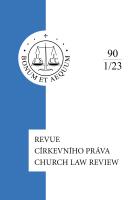Samuel Pufendorf (1632–1694) a jeho pojetí právního řádu jako syntézy racionalismu a zkušenosti
Samuel Pufendorf (1632–1694) and His Interpretation of the Legal Order as a Synthesis of Rationalism and Experience
Author(s): Radim SeltenreichSubject(s): Christian Theology and Religion, Philosophy, Law, Constitution, Jurisprudence, Civil Law, Ethics / Practical Philosophy, Theology and Religion, Canon Law / Church Law
Published by: Společnost pro církevní právo
Keywords: Samuel Pufendorf; natural law; rationalism; Holy Roman Empire; relationship between the State and the Church;
Summary/Abstract: In his article, the author examines Samuel Pufendorf (1632–1694), who is considered one of the leading representatives of the conception of natural law. First of all, he tells us about the life of this thinker and his work in the German region and in Sweden where he also wrote his two most important works on natural law. He interprets this primarily as a synthesis of rationalist and empiricist approaches and points out that a person’s rights must be derived from his duties. Finally, the author also notes Pufendorf’s interpretation of religious life, emphasising his efforts to distinguish between the spheres of action of church and state, however much he includes both under the label of corporation. In conclusion, he also reminds us of Pufendorf’s critique of the state-law structure of the Holy Roman Empire, as well as of how his work was received in subsequent legal developments.
Journal: Revue církevního práva
- Issue Year: XXIX/2023
- Issue No: 90
- Page Range: 61-72
- Page Count: 12
- Language: Czech

